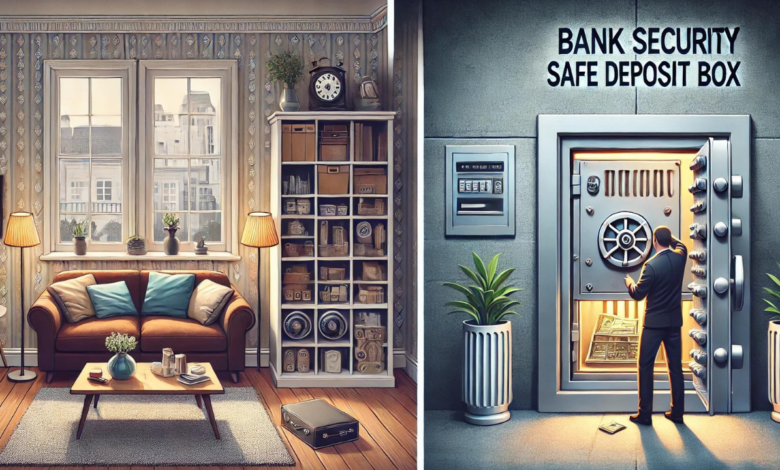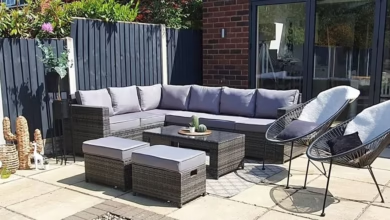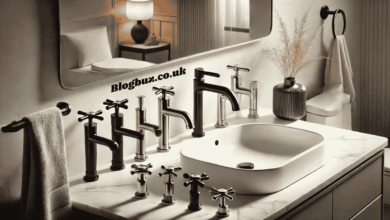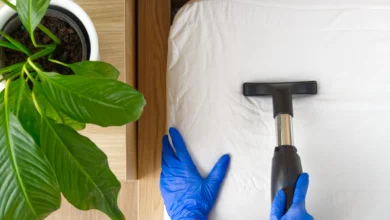Home Safes vs Bank Safe Deposit Boxes: Choosing the Best Option for Your Valuables

When it comes to protecting your valuable possessions, important documents, and cherished memories, two popular options stand out: home safes and bank safe deposit boxes. Both provide a secure way to safeguard your belongings, but which is better suited for your needs? This article explores the pros and cons of each option to help you make an informed decision.
Why Consider a Safe Storage Option?
With increasing concerns about theft, natural disasters, and other emergencies, having a secure place for your valuables is crucial. Items such as jewelry, legal documents, family heirlooms, and even cash require protection from unforeseen events. Both home safes and bank safe deposit boxes offer security, but they differ in convenience, accessibility, and cost.
What is a Home Safe?
A home safe is a secure, lockable box designed to be placed in a private residence. These safes come in various sizes and security levels, offering protection against theft, fire, water damage, and more. Home safes are typically used for storing important documents, cash, jewelry, firearms, and other valuable items.
Advantages of Home Safes
- Immediate Access: One of the primary benefits of a home safe is the ability to access your valuables at any time, day or night. Whether you need an important document or want to grab some cash, home safes offer instant accessibility.
- Privacy: Home safes provide a high level of privacy since no third parties are involved in the storage of your items. Only you and those you trust have access to the safe’s contents.
- Versatility: Home safes come in a variety of types, including fireproof, waterproof, and burglary-resistant options. This versatility allows you to choose a safe that fits your specific needs and concerns.
- Lower Long-term Costs: Although purchasing a quality home safe may involve an initial investment, there are no ongoing rental fees, making it a cost-effective solution in the long run.
- Customization: You can choose the size, type, and location of your home safe, whether it’s a wall safe, floor safe, or portable model. This allows you to integrate the safe seamlessly into your home’s design.
Disadvantages of Home Safes
- Vulnerability to Theft: Despite their security features, home safes can still be targeted by burglars, especially if the safe is not properly hidden or secured.
- Limited Space: Home safes typically offer less storage space compared to bank safe deposit boxes, which may be a limitation if you have many items to protect.
- No External Backup: In the event of a natural disaster that damages your home, your safe and its contents could also be compromised.
What is a Bank Safe Deposit Box?
A bank safe deposit box is a secure, individual storage compartment located within a bank’s vault. These boxes are rented by individuals or businesses to store valuables that require high levels of security. Access to safe deposit boxes is restricted to bank operating hours, and users must provide identification and a key to access their box.
Advantages of Bank Safe Deposit Boxes
- High Security: Banks offer a level of security that is hard to match at home, including monitored alarm systems, secure vaults, and limited access. This makes safe deposit boxes a strong deterrent against theft.
- Protection Against Natural Disasters: Bank vaults are typically designed to withstand fires, floods, earthquakes, and other disasters, offering a secure environment for your valuables.
- Peace of Mind: Knowing that your valuables are stored in a high-security environment can provide significant peace of mind, especially if you travel frequently or live in a high-risk area.
- Shared Access: You can grant access to trusted individuals, such as family members or business partners, by adding them to the account.
Disadvantages of Bank Safe Deposit Boxes
- Limited Access: Unlike home safes, safe deposit boxes are only accessible during bank operating hours. This can be inconvenient if you need access to your valuables during weekends, holidays, or emergencies.
- Ongoing Costs: Renting a safe deposit box involves a recurring fee, typically paid annually. While costs vary depending on the bank and box size, this can add up over time.
- No Insurance Coverage: Contrary to popular belief, items stored in safe deposit boxes are not insured by the bank. You may need to purchase additional insurance to cover the value of your belongings.
- Inconvenient Location: If the bank branch is far from your home, accessing your safe deposit box can be time-consuming and inconvenient.
Comparing Home Safes and Bank Safe Deposit Boxes
To help you decide which option is best for you, let’s compare some key aspects:
| Feature | Home Safe | Bank Safe Deposit Box |
| Accessibility | 24/7 access | Limited to bank hours |
| Security | Moderate | High |
| Cost | One-time purchase | Ongoing rental fees |
| Privacy | High, private access | Shared with bank staff |
| Protection from Disasters | Varies (fireproof options) | Typically high |
| Insurance | Optional | Additional coverage needed |
| Storage Space | Limited by size of safe | Depends on box size |
When to Choose a Home Safe
A home safe is ideal if:
- You want immediate and private access to your valuables.
- You prefer not to pay ongoing fees.
- You have valuable items that you use regularly or may need in an emergency.
- You are willing to invest in a high-quality, fireproof, and burglary-resistant safe.
When to Choose a Bank Safe Deposit Box
A bank safe deposit box is ideal if:
- You need to store items of high value or sensitive documents that are not frequently accessed.
- You seek the highest level of security available.
- You are comfortable with limited access during bank hours.
- You are willing to pay annual rental fees for peace of mind.
Making the Right Choice for Your Security Needs
Both home safes and bank safe deposit boxes offer valuable security options, but the best choice depends on your personal needs and preferences. Consider the level of accessibility, security, and protection you require. For those seeking convenient, 24/7 access and privacy, a home safe may be the ideal solution. If maximum security and protection from natural disasters are your top priorities, a bank safe deposit box might be the better choice. Regardless of your decision, protecting your valuables is a smart and responsible investment.
For more information on the best home safes available, visit Home Safes USA and explore a wide range of options to suit your security needs.
FAQs About Home Safes vs. Bank Safe Deposit Boxes
Q: Can I store cash in a home safe?
A: Yes, home safes are suitable for storing cash, along with other valuable items. Look for a safe that offers fire and burglary protection for added security.
Q: Are items in a bank safe deposit box insured?
A: No, items in a safe deposit box are not automatically insured by the bank. Consider purchasing additional insurance to cover the value of your belongings.
Q: What size safe deposit box do I need?
A: The size of the box you need depends on what you plan to store. Banks offer various sizes, so choose one that fits your items comfortably.
Q: Can I access my safe deposit box if the bank is closed?
A: No, safe deposit boxes are only accessible during the bank’s operating hours. Plan accordingly if you need access to your valuables.
Q: How can I increase the security of my home safe?
A: Place your safe in a hidden location, anchor it securely, and choose a model with high fire and burglary ratings for optimal protection.




